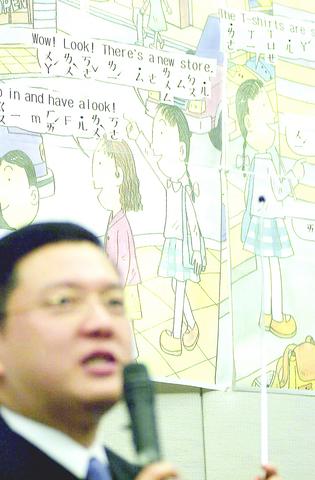Primary school kids are using unwieldy Mandarin phonetics in their English-language textbooks after the Ministry of Education ruled out teaching young pupils KK (Kenyon & Knott) symbols, a lawmaker claimed yesterday.
At a press conference, PFP Legislator Sun Ta-chien (

PHOTO: SEAN CHAO, TAIPEI TIMES
With natural phonetics, students learn English through listening to and speaking the language rather than through memorization and using KK phonetic symbols to pronounce English words.
Sun said that the pupils, unable to memorize pronunciation without the help of KK symbols, marked Bopomofo characters under almost every English word in the textbook.
In one example, the pupil jotted down eight Bopomofo characters and two English letters under the English phrase, "Let's go in and have a look."
Taken phonetically, the sentence read: "Lai Tzu Kou m Hai F Erl Lu Ko" -- far from the correct pronunciation of the sentence, Sun said.
"This is only one example in this pupil's English textbook. Examples like this fill the whole book. The student even reads `and' as `m,'" Sun said.
Pointing at other examples in the book, Sun said, "The way this kid assembles Bopomofo symbols to show English pronunciations is really beyond my imagination."
"The pupil is very inventive. But the reason he has resorted to this method is because he has never been taught KK phonetic symbols," Sun said.
"Without other means to help him pronounce English, he can only use this method," he said.
The ministry decided to adopt natural phonetics in primary schools because it considers KK phonetic symbols too difficult for fifth and sixth-graders to grasp.
Sun said that he is very concerned about the future of the nation's English education because more and more primary school students are learning English using Bopomofo.
"The natural phonetics approach is only effective in English-speaking countries. In those countries, students speak correct English without learning KK phonetic symbols because they practice the language in their daily lives," Sun said.
"But Taiwan is not an English-speaking country. Students forget the pronunciations after classes. Why should we copy the teaching methods of English-speaking countries? It is simply unrealistic," Sun said.
Arjay Lin (
"I try very hard to ask my pupils to read aloud after me in every class. We only have one hour for English every week. As we don't teach KK phonetic symbols, most students forget the pronunciations after class," he said.
Deniro Lin (
According to Deniro Lin, the English proficiency of his first-grade students has polarized.
Those who can afford to attend private language schools find KK phonetic symbols boring, whereas students who have never learned the symbols hardly know how to pronounce English, Deniro Lin said.
Meanwhile, Chen Ming-yin (

Taipei has once again made it to the top 100 in Oxford Economics’ Global Cities Index 2025 report, moving up five places from last year to 60. The annual index, which was published last month, evaluated 1,000 of the most populated metropolises based on five indices — economics, human capital, quality of life, environment and governance. New York maintained its top spot this year, placing first in the economics index thanks to the strength of its vibrant financial industry and economic stability. Taipei ranked 263rd in economics, 44th in human capital, 15th in quality of life, 284th for environment and 75th in governance,

The Sports Administration yesterday demanded an apology from the national table tennis association for barring 17-year-old Yeh Yi-tian (葉伊恬) from competing in the upcoming World Table Tennis (WTT) United States Smash tournament in Las Vegas this July. The sports agency said in a statement that the Chinese Taipei Table Tennis Association (CTTTA) must explain to the public why it withdrew Yeh from the WTT tournament in Las Vegas. The sports agency said it contacted the association to express its disapproval of the decision-making process after receiving a complaint from Yeh’s coach, Chuang

Control Yuan Secretary-General Lee Chun-yi (李俊俋) tendered his resignation last night, admitting that he had misused a government vehicle, as reported by media. His resignation was immediately accepted by the Control Yuan. In a statement explaining why he had resigned, Lee apologized for using a Control Yuan vehicle to transport his dog to a pet grooming salon on May 20. The issue first came to light late last month, when TVBS News reported that Lee had instructed his driver to take the dog to the salon. The news channel broadcast photos that it said were taken by an unnamed whistle-blower, which purportedly showed the

A former officer in China’s People’s Liberation Army (PLA) who witnessed the aftermath of the 1989 Tiananmen Square massacre has warned that Taiwan could face a similar fate if China attempts to unify the country by force. Li Xiaoming (李曉明), who was deployed to Beijing as a junior officer during the crackdown, said Taiwanese people should study the massacre carefully, because it offers a glimpse of what Beijing is willing to do to suppress dissent. “What happened in Tiananmen Square could happen in Taiwan too,” Li told CNA in a May 22 interview, ahead of the massacre’s 36th anniversary. “If Taiwanese students or